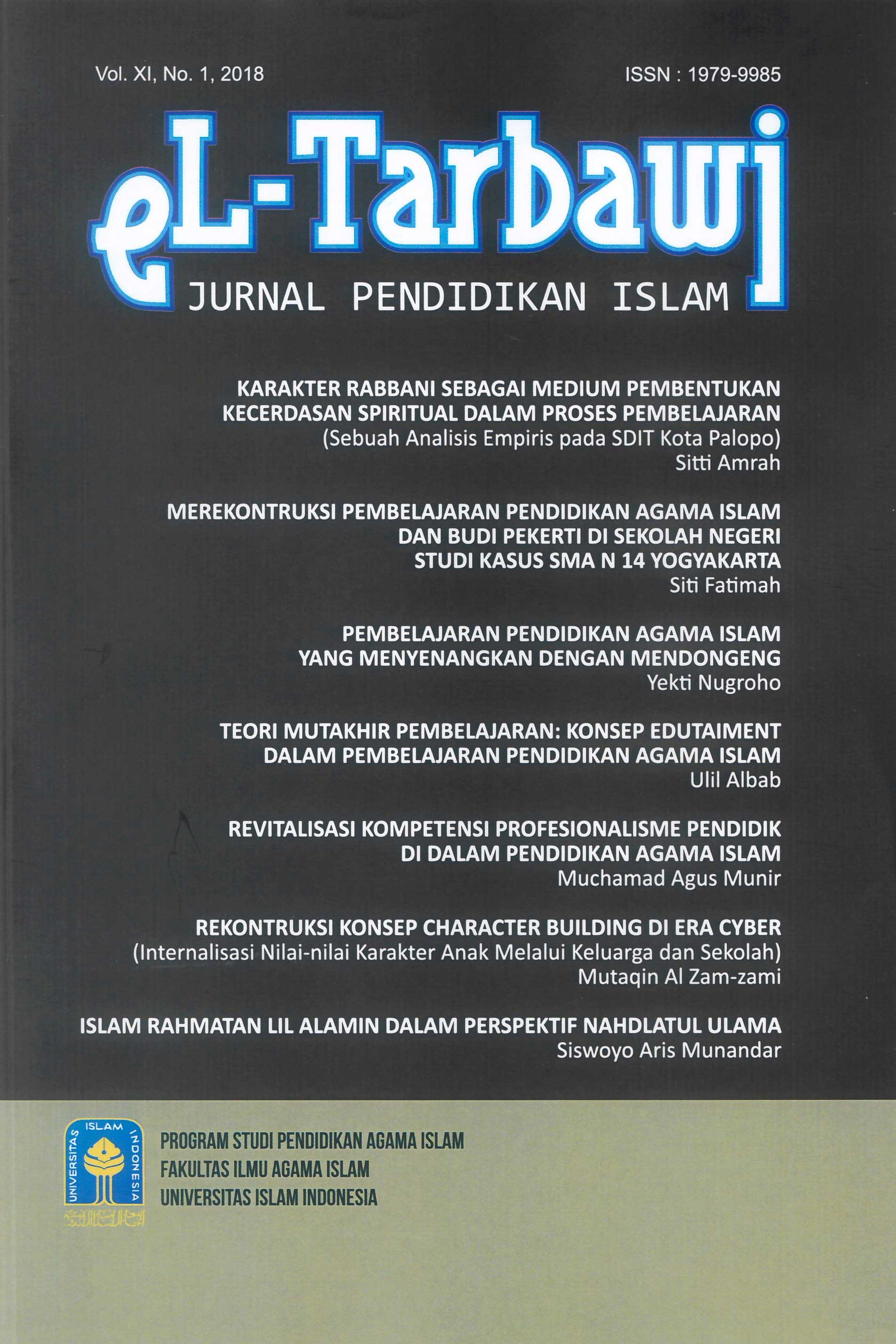Main Article Content
Abstract
One of the learning strategies for early childhood education is storytelling, storytelling or storytelling, we can also use in teaching Islamic Education learning material. The learning challenge of Islan Religious Education at the level of early childhood is boredom and boredom caused by the stigmatization of teaching the same teacher. Storytelling not only conveys interesting and fun stories for children, but we can also insert moral values and even tell the history of the Prophet, student moral learning, train social sensitivity, perfect memorization of short letters, and the history of Islamic civilization. But of course there is a need for teachers to prepare interesting stories or stories, determine the media to be used such as teaching aids, master character, memorize storylines, present fairy tales with interesting techniques, prepare a comfortable place and prepare and practice before performing at front of children. So that the fairy tales delivered are not only able to meet the needs of children’s imagination and fantasy but also can shape the child’s personality, character and morals.
Keywords: Learning, Education, Islam, Storytelling
Article Details
Authors retain copyright and grant the journal right of first publication with the work simultaneously licensed under a Creative Commons Attribution (CC-BY-SA) 4.0 License that allows others to share the work with an acknowledgment of the work’s authorship and initial publication in this journal.
References
- Charner, Kathy, dkk. (2005). Permainan Berbasis Sentra Pembelajaran untuk Anak Usia 3 Sampai 6 Tahun. Jakarta. Erlangga.
- Gunarti, Winny. (2009). Anak Punya Masalah Al-Qur’an Menjawab 22 Masalah Anak-Anak dan Jawabannya Berdasarkan Al-Qur’an. Jakarta: Gramedia Pustaka Utama.
- Helmawati. (2014). Pendidikan Kelauraga. Bandung: Remaja Rosdakarya.
- Machali Imam, dan Muhajir. (2011). Pendidikan Karakter Pengalaman Implementasi Pendidikan Karakter di Sekolah. Yogyakarta: Aura Pustaka.
- Munawar, Budhi dan Rohman. (2017). Pendidikan Karakter Pendidikan Menghidupkan Nilai untuk Pesantren Madrasah dan Sekolah. Jakarta: The Asian Fondation.
- Musfiroh, Tadkiroatun. (2008). Memilih Menyusun dan Menyajikan Cerita untuk Anak Usia Dini. Yogyakarta: Tiara Wacana.
- Prawira, Purwa Atmaja. (2013). Psikologi Pendidikan dalam Perspektif Baru. Yogyakarta: Ar-Ruzz Media.
- Santrock, John W. (2007). Psikologi Pendidikan. Jakarta: Kencana Prenada Media Group.
- Setyanton , Tri. (2012). “Penggunaan Metode Bercerita bagi Anak Usia Dini di PAUD Smart Little Cilame Indah Bandung”. dalam Jurnal Empowerment. Vol. 1. Nomor 2.
- Shaliha, Viana Mell. (2014). Rumah 1000 Dongeng. Yogyakarta: Laksana Kids.
- Sugihastuti. (1996). Serba-Serbi Cerita Anak-Anak. Yogyakarta: Pustaka Pelajar.
- Syah, Muhibbin. (2013). Psikologi Pendidikan dengan Pendekatan Baru. Bandung: Remaja Rosdakarya.
- Tukiyah, Yoanna F. (2012). Kisah Indah Budi Pekerti, (Jakarta: Gramedia Pustaka Utama.
- Yaumi, Muhammad. (2014). Pendidikan Karakter Landasan Pilar dan Implementasi. Jakarta: Prenadamedia.
References
Charner, Kathy, dkk. (2005). Permainan Berbasis Sentra Pembelajaran untuk Anak Usia 3 Sampai 6 Tahun. Jakarta. Erlangga.
Gunarti, Winny. (2009). Anak Punya Masalah Al-Qur’an Menjawab 22 Masalah Anak-Anak dan Jawabannya Berdasarkan Al-Qur’an. Jakarta: Gramedia Pustaka Utama.
Helmawati. (2014). Pendidikan Kelauraga. Bandung: Remaja Rosdakarya.
Machali Imam, dan Muhajir. (2011). Pendidikan Karakter Pengalaman Implementasi Pendidikan Karakter di Sekolah. Yogyakarta: Aura Pustaka.
Munawar, Budhi dan Rohman. (2017). Pendidikan Karakter Pendidikan Menghidupkan Nilai untuk Pesantren Madrasah dan Sekolah. Jakarta: The Asian Fondation.
Musfiroh, Tadkiroatun. (2008). Memilih Menyusun dan Menyajikan Cerita untuk Anak Usia Dini. Yogyakarta: Tiara Wacana.
Prawira, Purwa Atmaja. (2013). Psikologi Pendidikan dalam Perspektif Baru. Yogyakarta: Ar-Ruzz Media.
Santrock, John W. (2007). Psikologi Pendidikan. Jakarta: Kencana Prenada Media Group.
Setyanton , Tri. (2012). “Penggunaan Metode Bercerita bagi Anak Usia Dini di PAUD Smart Little Cilame Indah Bandung”. dalam Jurnal Empowerment. Vol. 1. Nomor 2.
Shaliha, Viana Mell. (2014). Rumah 1000 Dongeng. Yogyakarta: Laksana Kids.
Sugihastuti. (1996). Serba-Serbi Cerita Anak-Anak. Yogyakarta: Pustaka Pelajar.
Syah, Muhibbin. (2013). Psikologi Pendidikan dengan Pendekatan Baru. Bandung: Remaja Rosdakarya.
Tukiyah, Yoanna F. (2012). Kisah Indah Budi Pekerti, (Jakarta: Gramedia Pustaka Utama.
Yaumi, Muhammad. (2014). Pendidikan Karakter Landasan Pilar dan Implementasi. Jakarta: Prenadamedia.
